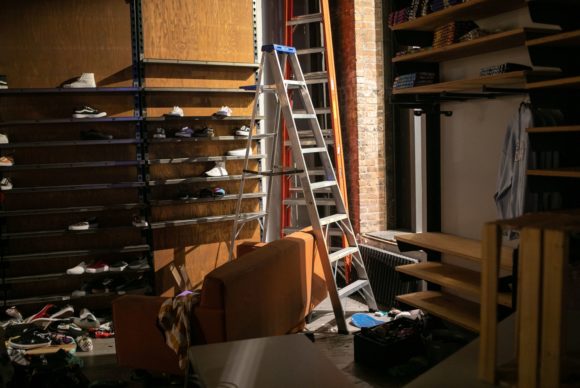Al’s, a sporting-goods store tucked in Wilmington, Delaware’s small shopping district, opened during the Great Depression, weathered World War II and has been able to keep workers on the job during the coronavirus pandemic. But this past weekend delivered a new challenge.
Owner Bob Hart closed the 17,000-square-foot shop at 4 p.m. Saturday as protesters walked Market Street, blocks away. A few hours later, around 8:15 p.m., the first of the store alarms went off. Looters who followed the peaceful demonstrations broke windows at the store and stole the majority of Hart’s inventory, including about 10,000 pairs of shoes.
Hart is among business owners digging into the details of their insurance policies to see what losses might be covered. Hart said he’s confident his claim will be successful, but that doesn’t make the process an easy one.
“For every item I’m missing, I have to supply an invoice. That could be real tough,” he said, with some items purchased a year or two ago. “You just gotta try to work through it.”
Protesters have come out in droves across the U.S. to speak out against the killing of George Floyd, an unarmed black man who died after a white Minneapolis police officer knelt on his neck for more than eight minutes — the latest incident of brutality against African-Americans. While the protests have been largely peaceful, some people have used the unrest as an opportunity to vandalize and loot stores in cities including New York, Los Angeles and Wilmington.
“It was wrong what they did to George Floyd — it’s sickening,” Hart said. “But when you take it out on somebody like me, who just has a small business,” he said, trailing off while shaking his head.
Tensions were high overnight as large crowds gathered in New Orleans and New York, yet the ninth straight night of protests over Floyd’s death remained largely peaceful in most cities.
On Top of Covid
The civil unrest comes as business owners continue to cope with the economic impact of the Covid-19 outbreak, which also required them to analyze the fine print of their insurance policies. While there’s been a debate about whether business-interruption insurance covers retailers’ pandemic-related losses, property damage from riots, civil commotion and vandalism are generally covered under standard policies, according to the Insurance Information Institute.
The insurance industry has argued that business-interruption coverage wouldn’t pay for virus losses because of a physical-damage requirement, an issue now being fought over by business owners, attorneys and lawmakers. The situation is clearer when there are broken storefronts from looting, said Kim Winter, who leads Lathrop GPM’s insurance recovery and counseling practice group.
“Here we know that there is actual direct physical damage — there’s no question about it, it’s more than just a microscopic virus, so that’s the difference,” she said.
Winter and Hahn Pam, an associate at Lathrop GPM, said policyholders should try to alert their insurers quickly, even though the protests are still going on, and study their coverage closely. While property damage is often covered, the double-whammy of the pandemic and looting could mean business-interruption claims become more complicated down the road, Winter said.
The 1992 riots in Los Angeles were the costliest civil-disorder event in U.S. history, totaling about $775 million in insured damage at the time, according to the insurance institute. That pales in comparison to damage done by some natural disasters, including Hurricane Katrina, which resulted in $41 billion in insured losses.
Verisk Analytics Inc.’s Property Claim Services, which analyzes various events, has already designated the latest riots a catastrophe, meaning they’ll probably cause more than $25 million in insured damage and affect a significant number of insurers and policyholders. The group hasn’t announced a firm estimate.
Meyer Shields, an analyst at Keefe, Bruyette & Woods, said in a June 1 note that the firm’s best guess is that insured damages should be “relatively modest,” but that the combination of those losses, costs tied to the pandemic and a hurricane season forecast to be stronger than normal could weigh on insurers.
“P&C insurers such as AIG, Chubb and Travelers may see manageable losses from riots across the U.S. possibly topping $2 billion, in our view, given the broader geographical exposure than previous unrest.”
–Matthew Palazola, senior industry analyst, and Derek Han, associate analyst
For now, business owners on the front lines are the ones navigating the aftermath. It isn’t clear when Al’s, the sporting-goods store in Wilmington, will be able to restock, with some suppliers unable to ship goods for weeks because of the pandemic, Hart said after putting a thick chain and padlock on the store’s temporary plywood door.
In Atlanta’s wealthy Buckhead neighborhood, looters hit Attom Concept Store, a black-owned clothing retailer, taking $100,000 of merchandise early Saturday morning. Owner Zola Dias, a Swiss immigrant, sells luxury clothes, shoes and accessories from fashion houses including Balenciaga and Givenchy and local designers.
Dias said he’d let his insurance policy lapse after closing more than two months ago because of Georgia’s Covid-19 lockdown. It was hard to cover the costs as well as his $20,000 monthly rent in the ritzy Buckhead Village plaza, he said. Dias had planned to open on Monday, but found the windows smashed and store ransacked when he stopped by at 5 a.m. Saturday. For now, he’s started a fundraiser and is counting on the generosity of customers to reopen.
“This store is very famous,” said Dias, whose shop’s Instagram page is filled with pictures of Atlanta hip-hop artists and other celebrities with his apparel. He vents at the injustice of looters targeting a black-owned shop. “We’ve been here for almost four years, so people know us.”
Photo: A looted store in New York on June 1, 2020.. Bloomberg Photo.
Topics USA Profit Loss New York Property COVID-19
Was this article valuable?
Here are more articles you may enjoy.



 FBI Disrupts Vast Chinese Hacking Operation That Infected Consumer Devices
FBI Disrupts Vast Chinese Hacking Operation That Infected Consumer Devices  Snowflake Hacker Still Active, Finding New Victims, Expert Says
Snowflake Hacker Still Active, Finding New Victims, Expert Says  Industry Critiques Trump’s Auto Insurance Rate Data, Promise to Cut Premiums
Industry Critiques Trump’s Auto Insurance Rate Data, Promise to Cut Premiums  As E&S Market Growth Hits New Heights, Some Risk May Be There to Stay: AM Best
As E&S Market Growth Hits New Heights, Some Risk May Be There to Stay: AM Best 

